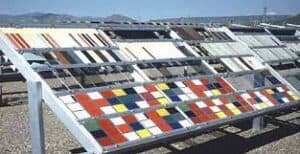Abrade
A term that describes the etching of a surface to provide a suitable key before painting. This can be carried out by hand using abrasive wet or dry carborundum paper, sandpaper or mechanical means by way of grit\sand blasting.
Abrasive Resistance
| Abrasive resistance. Resistance to a coating being able to withstand constant friction/rubbing. |
Abrasives
Materials used for the preparation of surfaces generally relate to agents used for blast cleaning, such as copper, slag, steel grit/shot carborundum; glass paper – waterproof carborundum paper/cloth is also included within this description.
Absorption
The taking in of liquid into a new surface such as brick, concrete, timber, plaster. On new work absorption of the first coat of material into the surface is required as a primer/sealer coat to provide maximum adhesion for subsequent coats.
Accelerated Weather Testing
External weathering test bed to establish the durability of paint coatings.
to establish the durability of paint coatings.
Accelerated Weathering
A laboratory test method used to simulate the exterior performance properties of paint coatings by passing coated panels through a cycle of lights, heat and wetness. There is no standard performance test and manufacturers use different cycles.
Accelerator
Also known as Activator or Catalyst – a material which accelerates the curing/hardening of certain types of coatings, e.g. epoxy-polyamine. Can also be used to accelerate the hardening of concrete (see Hardener).